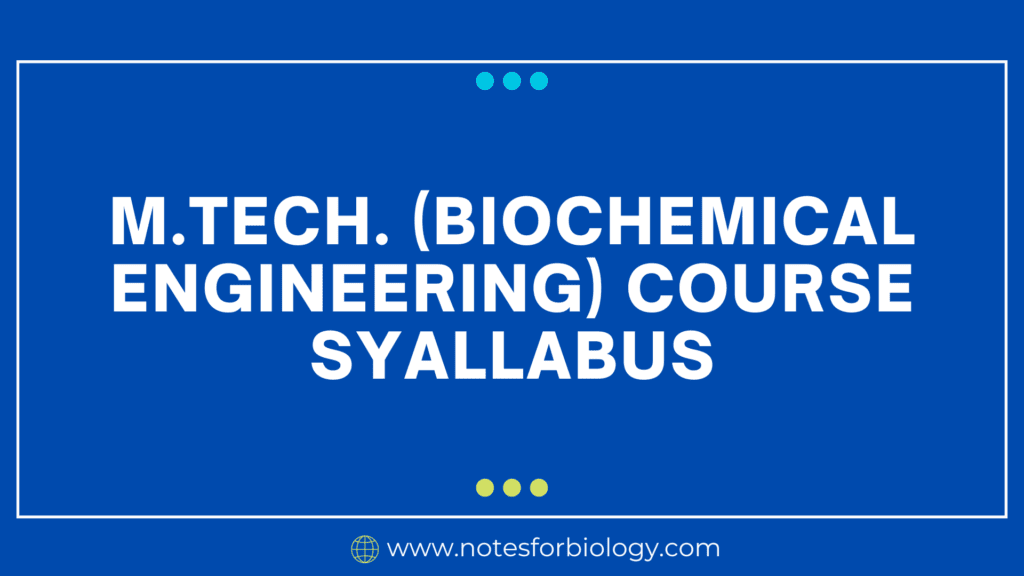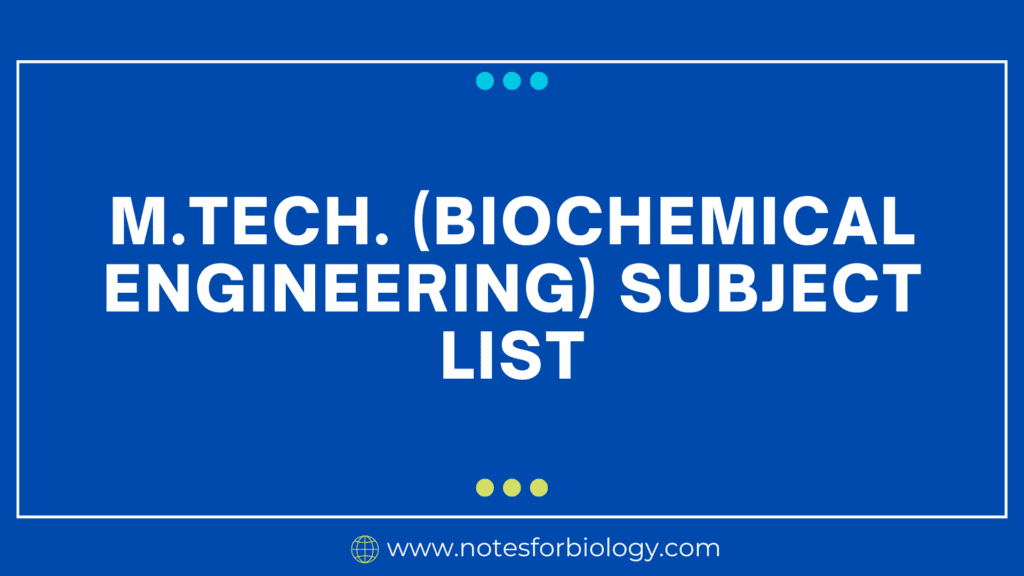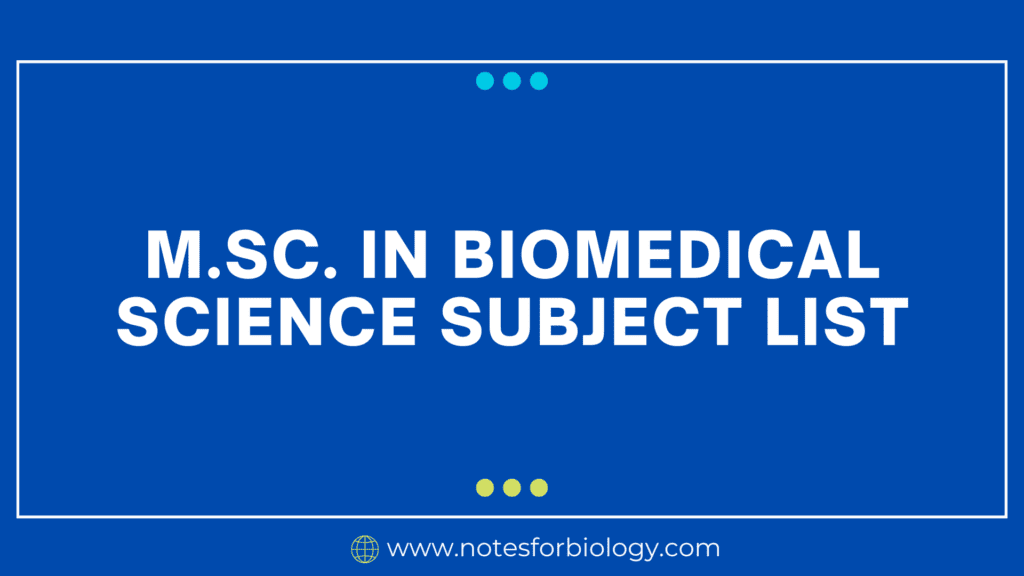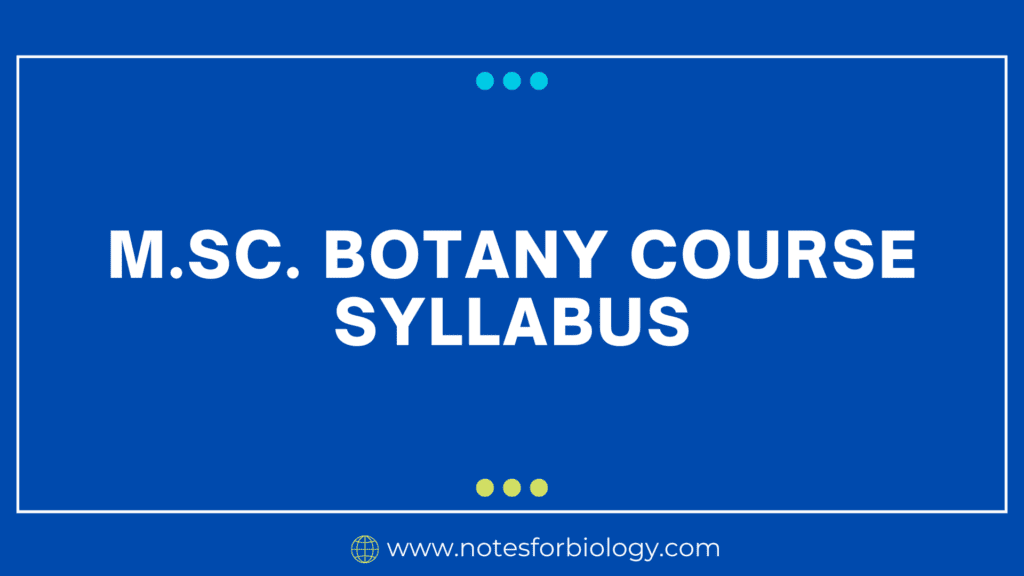M.Tech in Biochemical Engineering is a postgraduate program that explores the application of engineering principles to biological systems and processes. The aim of M.Tech in Biochemical Engineering is to develop innovative solutions for various industries, including pharmaceuticals, biotechnology, food processing, and environmental engineering. Biochemical Engineering combines insights from biology, chemistry, and engineering, focusing on the design, development, and optimization of bioprocesses, bioreactors, and downstream processing techniques. Additionally, M.Tech in Biochemical Engineering addresses real-world challenges such as the production of biofuels, the creation of bioproducts and pharmaceuticals, and the development of sustainable technologies for environmental remediation and conservation.
Table of Contents
M.Tech (Biochemical Engineering) Semester Wise List
SEMESTER I
Subject 1: BIOPROCESS PRINCIPLES AND TECHNOLOGY
COURSE OUTCOMES (CO)
After completion of the course M.Tech in Biochemical Engineering, the students will acquire:
- an understanding of fundamental concepts and principles of bioprocess systems
- knowledge of industrially important microbes, their isolation, improvement and preservation
- concepts in design and optimization of medium for industrial applications in bioprocesses
- knowledge of design and operation of bioprocesses
- an understanding of the real industrial scale production of various valued bioproducts.
COURSE CONTENT
Bioprocess calculations
Basic concepts. Fundamentals of material and energy balance for processes with/without chemical reaction. Simultaneous mass and energy balance in flow and without flow conditions.
Microbiological Aspects
Isolation, preservation and screening of industrially important microorganisms, Quality improvement of microorganism: isolation of mutants, recombinant microorganisms: preparation, selection and screening, inoculum development for fermentation
Microbial nutrition
Nutritional requirements for growth and product formation. Medium design and optimization with statistical analysis (ANOVA), Placket-Burman and Central Composite Design technique, Pre-treatment of industrial raw materials.
Fermentation
Various types of Fermentation, submerged fermentation, solid state fermentation, solid surface fermentation, aerobic and anaerobic fermentation, overview of biosynthetic mechanisms.
Industrial Bioprocess
Process technology for production of primary metabolites, such as baker’s yeast, ethanol, citric acid, amino acids, polysaccharides and plastics. Microbial production of industrial enzymes-glucose isomerase, cellulase, amylase, protease etc., Production of secondary metabolites- penicillins and cephalosporins
Subject 2: ENZYME TECHNOLOGY AND APPLICATIONS
COURSE OUTCOMES (CO)
After the completion of course M.Tech in Biochemical Engineering, the students will be able to:
- Analyze the structure of enzymes with reference to its influence on classification, function and solubility
- Understand basic principles and methodologies of enzyme technology in order to manipulate a given strain for the desired function
- Construct enzyme reactors for mobilized and immobilized enzymes along with the skills to carry out enzyme kinetics
- Apply the principles of enzyme engineering techniques to conceptulaize and deliver solutions pertaining to industrial, environmental and social problems
- Write a simple research proposal, business plan, and market analysis on the current and updated modern tools and technologies for a biotechnology invention and sustainable development
COURSE CONTENT
Enzyme Fundamentals
Introduction to enzymes, Classification, Sources, Mechanism of enzyme action. Strategies of purification of enzymes, criteria of purity, molecular weight determination and characterization of enzymes , Enzymes of biological importance, application of enzymes: Functional group interconversion using enzymes, Retrosynthetic biocatalysis, Chemoenzymatic synthesis of natural products; sources of enzymes, enzymes from extreme Thermophilic and Hyperthermophilic microorganisms (extremozymes)
Pre-Steady–State Kinetics
Pre-Steady–State Kinetics: Rapid mixing, stopped flow and Relaxation techniques, Determination of the number of active sites of enzyme and determination of rate constants. Enzyme kinetics at limiting conditions: Dilute substrates, solid substrates and enzyme activity at interfaces.
Multi-Substrate Enzyme Kinetics
Kinetics of Multi-Substrate Reactions: Mechanism for two substrates reactions, compulsory order, random order reactions and Ping-Pong mechanism. Kinetics of biphasic liquid systems, stabilization of biphasic aqueous-organic systems and equilibrium in biphasic aqueous-organic systems
Factors Affecting Enzyme Activity & Active Site Studies
Factors Affecting Enzyme Activity: Temperature and pH effects, thermal deactivation of enzymes. pH dependence: Ionization of Acids and Bases. Active Site Studies: The identification of binding sites and catalytic sites, Trapping the enzyme substrate complex, The use of Substrate analogues, Enzyme modification by chemical procedures affecting amino acids side chains, the enzyme modification by treatment with proteases and site-directed mutagenesis.
Enzyme Immobilization
Enzyme Immobilization & Kinetics of Immobilization: Immobilization of Biocatalysts an Introduction, Electrostatic effect, Effect of charged and uncharged support, Effect of external and internal mass transfer, Effect of Intra-particle diffusion with uncharged supports, Simultaneous external and internal mass transfer resistances and partitioning effects. Dam Kohler number and effectiveness factor.
Applied and Industrial Enzyme Technology
Bioreactors for soluble and immobilized enzymes, Mass transfer and catalysis in immobilized enzyme reactors, Enzyme based biosensors; Enzyme catalyzed processes with cofactor regeneration; Enzymatic reactions in micro-aqueous medium and nonconventional media. Case studies involving enzyme application in industrial bioprocess: Industrial process using enzymes for production of drugs, fine biochemicals and chiral intermediates etc.
SEMESTER II
Subject 1: BIOPROCESS ANALYSIS AND REACTOR DESIGN
COURSE OUTCOMES (CO)
After the completion of course M.Tech in Biochemical Engineering, the students will be able to:
- Analyze the bioreactor principles and to compare the various types of reactors with reference to its influence on classification and function
- Understand bioprocess engineering or biochemical reaction engineering in order to manipulate a continuous system for the desired function
- Construct bioreactor for natural and modified products along with the skills to carry out evaluation of the biosimulator
- Apply the principles of engineering techniques to conceptualize and deliver solutions pertaining to industrial, environmental and social problems
- Write a simple research proposal, business plan, and market analysis on the current and updated modern tools and technologies for a biotechnology invention and sustainable development
COURSE CONTENT
Reaction kinetics
Reaction thermodynamics, order and molecularity of reaction, homogeneous and heterogeneous reactions, elementary and non elementary reactions, reaction yield, reaction rate, calculation of reaction rates from experimental data, general reaction kinetics for biological system, production kinetics in cell culture, kinetics of substrate uptake in cell culture, growth kinetics with plasmid instability, kinetics of bisubstrate enzyme reactions, kinetics of enzyme deactivation.
Single reactor system
Constant volume and variable reactors, batch operation of a well mixed enzyme and cell culture reactor, fed batch operation of a well mixed enzyme and cell culture reactor, continuous operation of well mixed enzyme and cell culture reactor, continuous operation of plug flow enzyme and cell culture reactor, autocatalytic reactions, recycle reactors-plug flow reactor and continuous stirred tank reactor, comparison between major modes of reactor operation.
Multiple reactor system
Continuous stirred tank reactors of equal size in series, continuous stirred tank reactors of unequal size in series, finding conversion in given system, determining the best system for a given conversion, plug flow reactors in series and parallel, reactors of different types in series.
Multiple reactions
Simple reactions, stepwise reactions, parallel reactions, series reactions, maximizing r in batch reactor, plug flow reactor and continuous stirred tank reactor, reactor choice for series reactions and series parallel reactions, reversible reactions.
Design for multiple reactions
Reactions in parallel- qualitative discussion about product distribution, quantitative treatment of product distribution and reactor size, selectivity. Reactions in series-quantitative discussion about product distribution in plug flow and batch reactor.
Deviations from ideal reactors
Concept of non ideality, reasons of non ideality, RTD studies, f curve, c curve, e curve, diagnosis of ills of flow reactors, modeling of non-ideal behavior-dispersion model, tanks in series model.
Control Systems
Introduction to Process control systems, Use of Laplace & Inverse Laplace Transformation in study of Process Dynamics & Control. Dynamic Modeling of a Process, Dynamic behavior of First order system, First order systems in series & second & higher order systems for various kinds of inputs, Linearization of nonlinear systems, Transportation & Transfer Lag, Classification of control systems, Regulator & Servo control, Feed Forward & Feed backward control, Negative & Positive Feedback Control, Variables & Physical Elements of a Control system, Modes of control action, Controllers & Final control Elements, Reduction of Block & Signal Flow Diagrams, closed loop transfer function.
Subject 2: MICROBIAL BIOCHEMISTRY
COURSE OUTCOMES (CO)
After the completion of the course M.Tech in Biochemical Engineering, the student will acquire:
- An understanding of the cellular structure, function and diversity of microbes present on earth
- The knowledge of nutrients required by microbial cells and will be able to design and prepare media for microbial culture
- An understanding of the microbial metabolism which can be harnessed for enhanced production of microbial metabolites
- The knowledge of specialized pathways in microbial metabolism that are harnessed for biochemical processing and bioenergy production
- An understanding of the genetic basis of microbial diversity and evolution which can be manipulated for strain improvement
COURSE CONTENT
Unit I
Cell Structure (Special emphasis on Cell Wall & Membrane) and Microbial Diversity Structural differences between different microbial cell types and cellular organelles; Biochemical/Microscopic/ Molecular methods used to differentiate between archae, eubacteria and eukaryotes; Cell wall of prokaryotes; Outer membrane of Gram –ve bacteria and control of its synthesis; Potential targets for drug design.
Unit II
Biomolecules and Principles of Microbial Nutrition Importance of non-covalent interactions in biological systems; Non-informational and Informational Macromolecules and their organization; Microbial nutrition; Different types of culture medium; C/N/P balance and making of culture medium.
Unit III
Bioenergetics and Catabolic Pathways Oxidation-reduction reactions; Electron carriers and cellular metabolism; High energy compounds and their role in microbial fermentations; Enzymes as catalysts; Cellular metabolites and interconnectivity in biochemical pathways; Respiration and Electron Transport.
Unit IV
Metabolic diversity, Energy from oxidation of inorganic electron donors; Iron oxidation; Methanotrophy and methylotrophy; Nitrate and Sulfate reduction; Acetogenesis; Methanogenesis; Fermentation-energetics and redox constraints; Anaerobic respiration; Chlorophylls and other pigments involved in microbial photosynthesis; Anoxygenic and oxygenic photosynthesis; Autotrophic CO2 Fixation: Calvin cycle, Reverse Citric Acid cycle, Hydroxypropionate cycle.
Unit V
Microbial Genetics and Genomics Mutations and their chemical basis; Mutagens and their use in Biotechnology; Modes of recombination; Comparative prokaryotic genomics.
SEMESTER III
| Course No | Title of the Course | Course Structure | Pre-Requisite |
| BCC05 | SEMINAR | 0L-0T-4P | None |
| Course No | Title of the Course | Course Structure | Pre-Requisite |
| BCC05 | SEMINAR | 0L-0T-4P | None |
SEMESTER IV
| Course No | Title of the Course | Course Structure | Pre-Requisite |
| BCC05 | SEMINAR | 0L-0T-4P | None |
Related Syllabus




